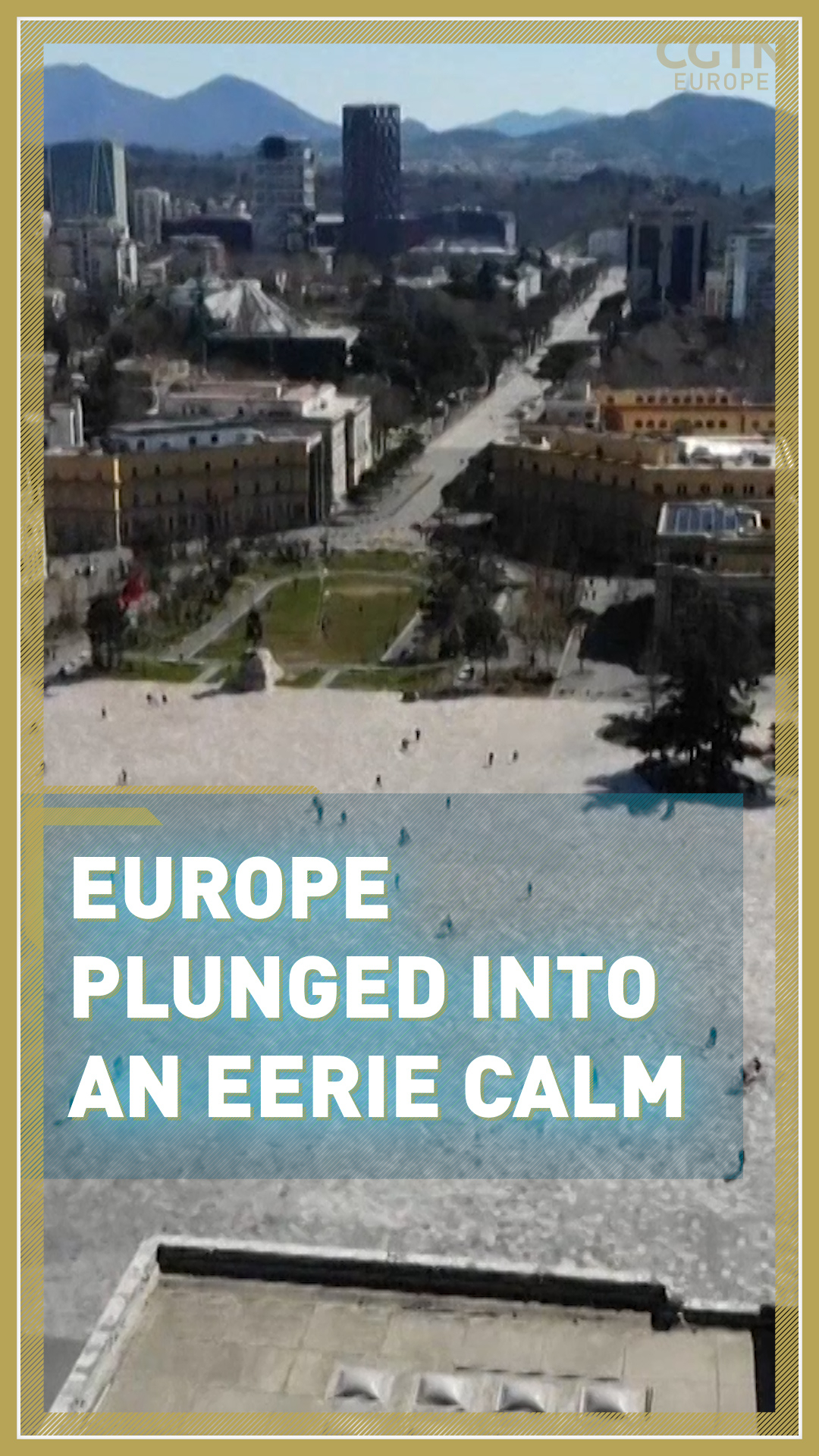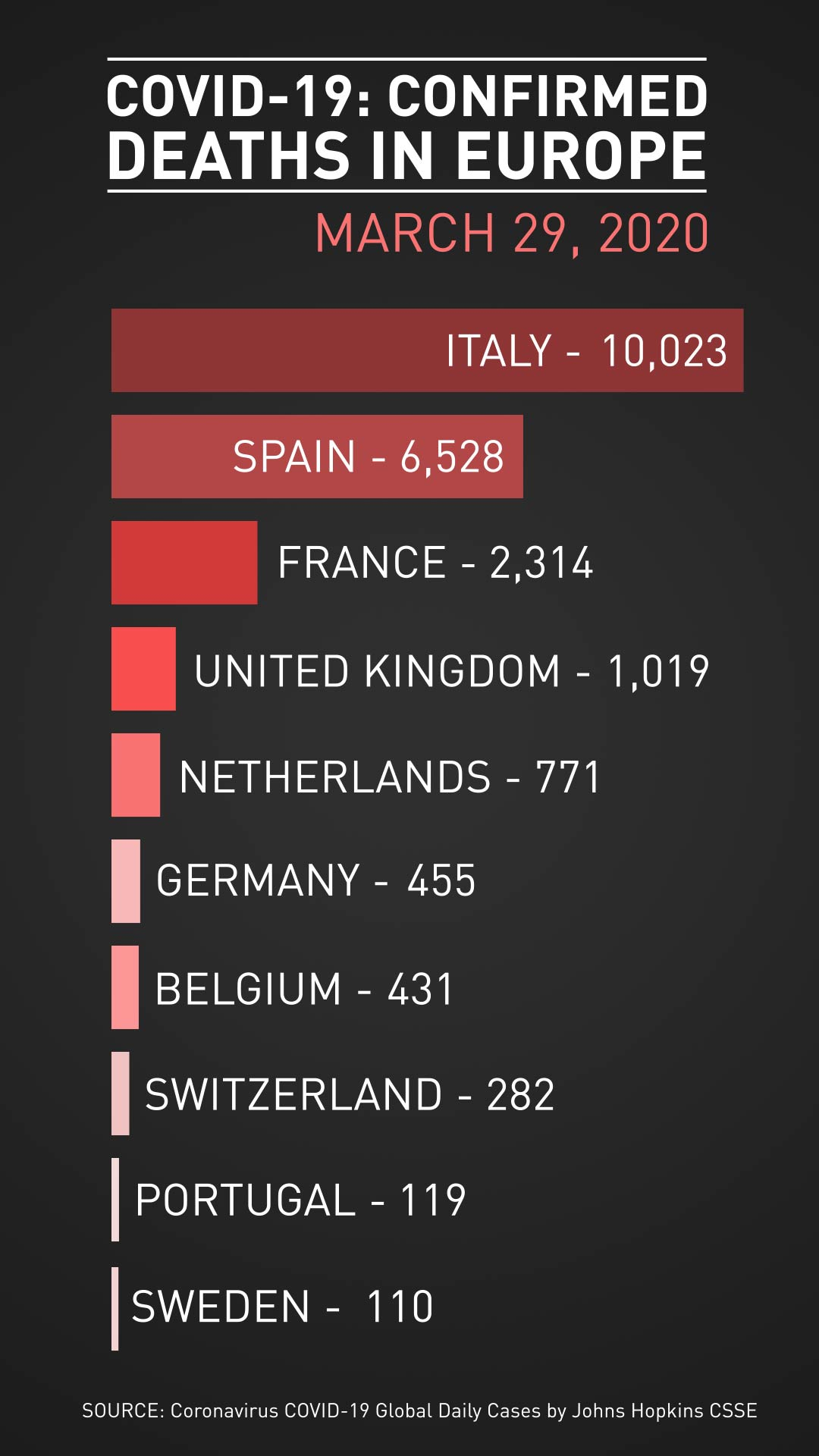TOP HEADLINES
• Spain's COVID-19 death toll has reached 6,528; the 838 new deaths recorded on Saturday is the country's worst single-day rise. Read more
• Italy is nearing the peak of its outbreak, according to deputy health minister Pierpaolo Sileri, who expects cases will start to drop in a "maximum" 10 days. However, Italy's regional affairs minister said the country will "inevitably" extend its lockdown beyond 3 April
• France's minister for European affairs said that the credibility of the EU depends on its response to the outbreak: "If Europe is just a single market when times are good, then it makes no sense"
• Austrian chancellor Sebastian Kurz has reacted angrily after his country was delayed in efforts to import face masks from Germany: "After the crisis is over, there will have to be tough discussions within the EU"
• Ireland's government is to release a voluntary phone-tracking app: if the user tests positive, the app will alert anyone in recent close contact
• With UK Prime Minister Boris Johnson saying "things will get worse before they get better," the country's lockdown may have to last until June, according to the Imperial College professor whose advice made Johnson's government change tactics
• Portugal has granted temporary legal residency to all asylum seekers who have already begun application, as "an act of solidarity at a time of crisis." Read more
• Germany's health system could be overstretched as the outbreak worsens, according to the head of the federal agency responsible for disease control. For more, see our correspondent below
01:24

ACROSS EUROPE
By Rahul Pathak in Madrid
Despite two weeks of lockdown the daily death toll in Spain continues to rise. The latest health ministry figures said 838 had died from coronavirus in the last 24 hours. That's the highest day-on-day increase seen since the crisis began.
Those figures, added to the fact intensive care units (ICUs) are becoming overwhelmed, have prompted prime minister Pedro Sanchez to intensify the lockdown. The opposition say they approve stricter measures but say they should have been implemented long before now.
Spanish airline Iberia has also announced that it is establishing an air-link with China to bring 90 tons of healthcare materials to Spain.
By Ross Cullen in Paris
The next two weeks will be the toughest yet in the fight against coronavirus in France, prime minister Edouard Philippe has warned: "The needs in terms of intensive care are exploding and we might have, here or there some difficulties with supply." He and his government colleagues are racing to obtain protective gear, with more than a billion masks ordered from abroad.
The country's outbreak initially took hold in eastern France, where hospitals have become overwhelmed, and has been spreading west. On Sunday, 50 more patients will be transferred from the Grand Est region to other parts of France. The country's top epidemiologist has cautioned that the effects of the 12-day-old French lockdown will only show in the number of cases at the end of next week.

A COVID-19 patient from Metz in France is transported from a military helicopter for treatment at the University Hospital in Essen, Germany. /Marcel Kusch/dpa via AP
A COVID-19 patient from Metz in France is transported from a military helicopter for treatment at the University Hospital in Essen, Germany. /Marcel Kusch/dpa via AP
By Guy Henderson in Berlin
How long will the restrictions in Germany last? From a medical perspective, "as long as possible," says Lothar Wieler, the head of Germany's official public health body. In a newspaper interview published on Sunday, Wieler warns Germany is still at the beginning of the pandemic curve and that the country may still not have capacity to cope as the number of cases increases. There is, he says, still a shortage of ventilators. Protective clothing such as masks are also lacking.
Each of Germany's 16 states is dealing with this crisis in a slightly different way. Bavaria, for example, has implemented a lockdown that others haven't yet deemed necessary. Data shows that is proving more effective in restricting movement.
All Germans do have to adhere to new national social distancing rules though, including keeping a distance of 1.5 meters from each other in public and a ban on meet-ups of more than two people. Chancellor Angela Merkel has praised Germans for sticking to those rules. But during this sunny weekend, with people still allowed to head to parks and beaches, that has not always been possible.
Chancellor Merkel's chief of staff has made clear that although the German government may be working on an exit plan, ministers will not even consider easing the current restrictions until 20 April at the earliest. Even then, any phase-out will be gradual and informed by the progress of the disease. Not even the experts can predict exactly how that will go.
What Lothar Wieler does say is that a second wave is a real possibility at some point. So even if Europe's largest economy does begin to tick over once more, there's no guarantee that will last.
By Nicole Johnston in London
British Prime Minister Boris Johnson has warned the country in a letter that things "will get worse before they get better." The PM wrote the letter while in self-isolation at 10 Downing Street and said stricter measures may be enforced. Johnson has contracted COVID-19 and says he has mild symptoms.
He also said more restrictions could be imposed. "We will not hesitate to go further if that is what the scientific and medical advice tells us we must do," Johnson wrote. The letter is being posted to every British household along with a leaflet.
At 1700GMT Saturday the number of people who have died from the virus in the UK had risen to 1,019, a record single-day rise of 260. Stephen Powis, England's National Health Service director, said the UK "will have done well" if the country's death toll is below 20,000.
However, new modeling from the Imperial College in London indicates the number of deaths based on current projections and restrictions may be around 5,700. This is well under the 260,000 deaths projected under its earlier modeling, without public intervention and social distancing.
00:20

FROM OUR GLOBAL COLLEAGUES
From CGTN America: New Yorkers ignore stay-home advice as spring arrives
From CGTN Africa: Libya releases 466 prisoners over COVID-19 fears
From CGTN China: Business steadily resumes at markets and stores
CGTN Europe has been providing in-depth coverage of the novel coronavirus story as it has unfolded. Here you can read the essential information about the crisis.
Source(s): Reuters